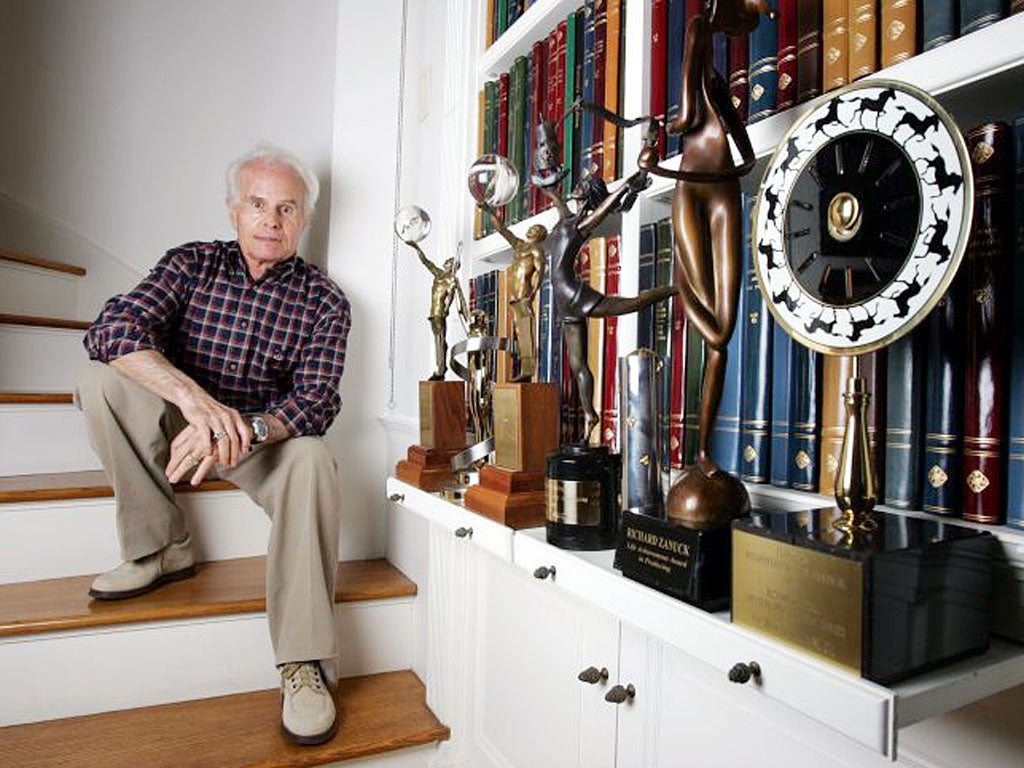
Your support helps us to tell the story
From reproductive rights to climate change to Big Tech, The Independent is on the ground when the story is developing. Whether it's investigating the financials of Elon Musk's pro-Trump PAC or producing our latest documentary, 'The A Word', which shines a light on the American women fighting for reproductive rights, we know how important it is to parse out the facts from the messaging.
At such a critical moment in US history, we need reporters on the ground. Your donation allows us to keep sending journalists to speak to both sides of the story.
The Independent is trusted by Americans across the entire political spectrum. And unlike many other quality news outlets, we choose not to lock Americans out of our reporting and analysis with paywalls. We believe quality journalism should be available to everyone, paid for by those who can afford it.
Your support makes all the difference.Film producer Richard Zanuck, who won the best picture Oscar for Driving Miss Daisy and was involved in such blockbuster films as Jaws and The Sting after his father, Hollywood mogul Darryl F. Zanuck, fired him from 20th Century Fox, has died. He was 77.
Zanuck's publicist said he died of a heart attack at his Beverly Hills home.
Zanuck's run of successes as an independent producer rivalled the achievements of his legendary father who reigned over 20th Century Fox from the 1930s until age and changing audience tastes brought him down.
The production company the younger Zanuck founded with David Brown produced The Sting in 1973, as well as Steven Spielberg's first feature film, The Sugarland Express, in 1974 and Spielberg's first blockbuster, Jaws, in 1975.
The Sting also won the best movie Oscar, although Zanuck and Brown were not listed as its producers.
Jaws was nominated for best picture, as was the Zanuck-produced The Verdict.
"In 1974, Dick Zanuck and I sat in a boat off Martha's Vineyard and watched the mechanical shark sink to the bottom of the sea," Spielberg recalled in a statement.
"Dick turned to me and smiled. 'Gee, I sure hope that's not a sign'. That moment forged a bond between us that lasted nearly 40 years. He taught me everything I know about producing. He was one of the most honourable and loyal men of our profession and he fought tooth and nail for his directors."
Zanuck most recently produced the big-screen adaptation of the cult classic TV series Dark Shadows, directed by Tim Burton and starring Johnny Depp and Michelle Pfeiffer.
Other Zanuck films include MacArthur and Cocoon.
In 1976, Zanuck and Brown announced a much-publicised deal with the estate of novelist Margaret Mitchell to produce a sequel to Gone With the Wind.
A book and script were prepared, but the project never materialised on film.
In 1988, Zanuck and Brown dissolved their partnership amicably, and Zanuck formed a new venture with his third wife, Lili Fini Zanuck. They won the Oscar with their first movie together, Driving Miss Daisy.
"Richard was a good and long-time friend," said Morgan Freeman, who co-starred with Jessica Tandy in the 1989 film.
"A very fine producer who was wonderful to work for and with."
The contrasts between Richard and Darryl Zanuck were many and led to father-son clashes throughout their respective careers.
Richard Zanuck was reserved, soft-spoken and friendly with directors, writers and actors, and he liked to operate from behind his desk.
His authoritarian father, on the other hand, paced his office, issuing orders in a squeaky voice and sometimes wielding a polo mallet (in his early years he had played polo with other Hollywood figures).
He would reach decisions quickly, and once he did they became studio law.
But after decades of success, the studio began to flounder under his rein in the 1960s when the big-budget movie musical era died and films such as Doctor Dolittle, Star and Hello, Dolly failed to earn their money back.
Under pressure from the board of directors, he fired his son in 1970 in an effort to save his own job, but the manoeuvre failed and he soon followed him out the door.
The dismissal shattered the younger Zanuck, and it was not until shortly before Darryl Zanuck's death in 1979 that the pair resolved their differences.
"It was different from the usual father-son relationship," Zanuck told The New York Times in 2003. "But I was able to patch everything up before my father died."
AP
Join our commenting forum
Join thought-provoking conversations, follow other Independent readers and see their replies
Comments